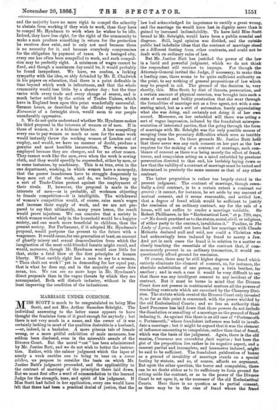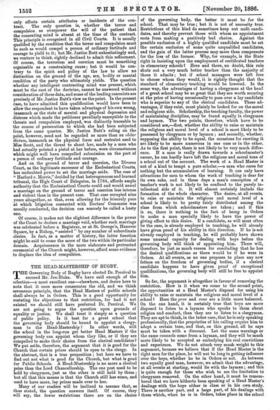MARRIAGE UNDER COERCION.
MISS SCOTT is much to be congratulated on being Miss Scott, and not Mrs. Arthur Saunders Sebright. The individual answering to the latter name appears to have thought the feminine form of it good enough for anybody ; but there is not very much in a name, and the owner of it was certainly lacking in most of the qualities desirable in a husband, —or, indeed, in a bachelor. A more piteous tale of female wrong, or a more pitiful exhibition of male meanness, has seldom been disclosed, even in the miserable annals of the Divorce Court. But the moral " cat " has been administered by Mr. Justice Butt, and we do not wish to better the instruc- tion. Rather, with the calmer judgment which the lapse of nearly a week enables one to bring to bear on a cause calibre, we propose to consider the basis on which Mr. Justice Butt's judgment proceeded, and the applicability to the contract of marriage of the principles there laid down. But we must first offer a word of commendation to the learned Judge for the strength, tone, and spirit of his judgment. If Miss Scott bad failed in her application, every one would have felt that there had been a practical denial of justice, that the
law had acknowledged its impotence to rectify a great wrong, and the marriage tie would have lost in dignity more than it gained by increased indissolubility. To have held Miss Scott bound to Mr. Sebright, would have been a public scandal and disgrace. Still, legal opinion was divided, and the outside public had indefinite ideas that the contract of marriage stood on a different footing from other contracts, and could not be dealt with on ordinary rules of law.
But Mr. Justice Butt has justified the power of the law in a lucid and powerful judgment, which we do not think the respondent will venture to impugn. For though the Attorney-General invited the Judge, if necessary, to make this a leading case, there seems to be quite sufficient authority on the point, to say nothing of general propositions of law which may be prayed in aid. The ground of the decision is, very shortly, this. Miss Scott, by dint of threats, persecution, and a certain amount of physical coercion, was brought into such a state of mental and bodily prostration that she went through the formalities of marriage not as a free agent, not with a con- senting mind, but as a sort of automaton, barely appreciatieg what she was doing, and certainly not doing it of her own accord. Moreover, on her enfeebled will there was acting a sort of vague impression, induced by the fraudulent misrepre- sentation of interested parties, that the going through the form of marriage with Ur. Sebright was the only possible means of escaping from the pecuniary difficulties which were so terribly pressing upon her. On these grounds Mr. Justice Butt held• that there never was any such consent on her part as the law requires for the making of a contract of marriage, such sem- blance of consent as there was being merely the effect of fraud, terror, and compulsion acting on a mind enfeebled by previous persecution directed to that end, his lordship laying down as law that the validity of a contract of marriage must be tested and determined in precisely the same manner as that of any other contract.
The latter proposition is rather too largely stated in the present judgment. The contract of marriage, though essen-
tially a civil contract, is to a certain extent a contract aui generis ; it cannot, for instance, be set aside by any amount of
mutual consent, and it seems reasonable, and settled law, that a degree of fraud which would be sufficient to justify the rescission of an ordinary contract, say for the sale of a house, will not suffice to render a marriage voidable. Sir Robert Phillimore, in his " Ecclesiastical Law," at p. 720, says,
—" No deceit practised as to the status, moral, civil, or religious, of either party to the contract, invalidates it." Pauline, in The Lad!' of Lyons, could not have had her marriage with Claude Melnotte declared null and void, nor could a Christian who
had unknowingly been induced by fraud to marry a Jew. And yet in such cases the fraud is in relation to a matter so closely touching the essentials of the contract that, if com- mensurately present in an ordinary transaction, it would un- questionably afford ground for rescission.
Of course, there may be still higher degrees of fraud which entirely eliminate the element of consent, as, for instance, the absolute substitution of one person, say a twin brother, for another ; and in such a case it would be very difficult to say that there was any intelligent consent to any incident of the contract. But it must be borne in mind that the Divorce Court does not possess in matrimonial matters all the powers of rescinding contracts which are exercised by the Chancery Divi- sion. The statute which created the Divorce Court only invested it, so far as this point is concerned, with the power wielded by the old Ecclesiastical Courts ; and no less an authority than Lord Penzance has laid down that these powers do not include, the dissolution or annulling of a marriage on the ground of fraud inducing it. As against this there is an old case of "Portsmouth v. Portsmouth," where fraudulent influence was held to invali- date a marriage ; but it might be argued that it was the element of influence amounting to compulsion, rather than that of fraud, which was the basis of the judgment. Again, there is the old maxim, Consensus non concubitus facit nuptial; but here the gist of the proposition lies rather in its negative aspect, and a consent partial and incomplete, and howsoever induced, might be said to be sufficient. The fraudulent publication of banns as a ground of invalidity of marriage stands on a special footing by statute, and so, of course, affords no argument. But upon the other question, the terror and compulsion, there can be no doubt either as to its sufficiency to form ground for setting aside the contract, or as to the power of the Divorce Court to act upon it, as the successor of the old Ecclesiastical Courts. Here there is no question as to partial consent, as there may be in the case of fraud where the fraud
only affects certain attributes or incidents of the con- tract. The only question is, whether the terror and compulsion so overpower the will of the patient that the consenting mind is absent at the time of the contract. This principle is recognised in all Civil Courts. It is usually qualified by the condition that the terror and compulsion must be such as would compel a person of ordinary fortitude and courage to yield to it; but Mr. Justice Butt unhesitatingly and, we venture to think, rightly declined to admit this refinement. Of course, the terrorism and coercion must be something cognisable as a constraining cause ; but it would be con- trary to the spirit and policy of the law to allow no distinction on the ground of the age, sex, bodily or mental condition of the party who ultimately yields. The question whether any intelligent contracting mind was present, which must be the root of the doctrine, cannot be answered without consideration of these data, and some of the leading canonists are precisely of Mr. Justice Butt's view on the point. In the present case, to have admitted this qualification would have been to allow the respondent to have taken advantage of his own wrong, inasmuch as the state of mental and physical depression and distress which made the petitioner peculiarly susceptible to the threats and compulsion employed, was distinctly traceable to the course of persecution to which she had been subjected from the same quarter. Mr. Justice Butt's ruling on the point, however, need not be regarded as more than an obitsr dictum, inasmuch as the physical force and restraint used to Miss Scott, and the threat to shoot her, made by a man who had actually pointed a pistol at her before, were circumstances which might well have compelled submission on the part of a person of ordinary fortitude and courage. And on the ground of terror and coercion, the Divorce Court, as the legitimate successor of the Ecclesiastical Courts, has undoubted power to set the marriage aside. The case of " Harford v. Morris," decided by that heterogeneous and learned tribunal, the High Court of Delegates, in 1784, affords ample authority that the Ecclesiastical Courts could and would annul a marriage on the ground of terror and coercion less intense and violent than in the present case. That case occupied nine years altogether, so that, even allowing for the leisurely pace at which litigation connected with Doctors' Commons was usually conducted, the decision can scarcely be called a hasty one.
Of course, it makes not the slightest difference in the power of the Court to declare a marriage void, whether such marriage was celebrated before a Registrar, or at St. George's, Hanover Square, by a Bishop, " assisted " by any number of subordinate clerics. In fact, as a matter of history, the latter function might be said to come the more of the two within its particular domain. Acquiescence in the more elaborate and protracted ceremonial of the Church might, however, afford some evidence to displace the idea of compulsion.



































 Previous page
Previous page